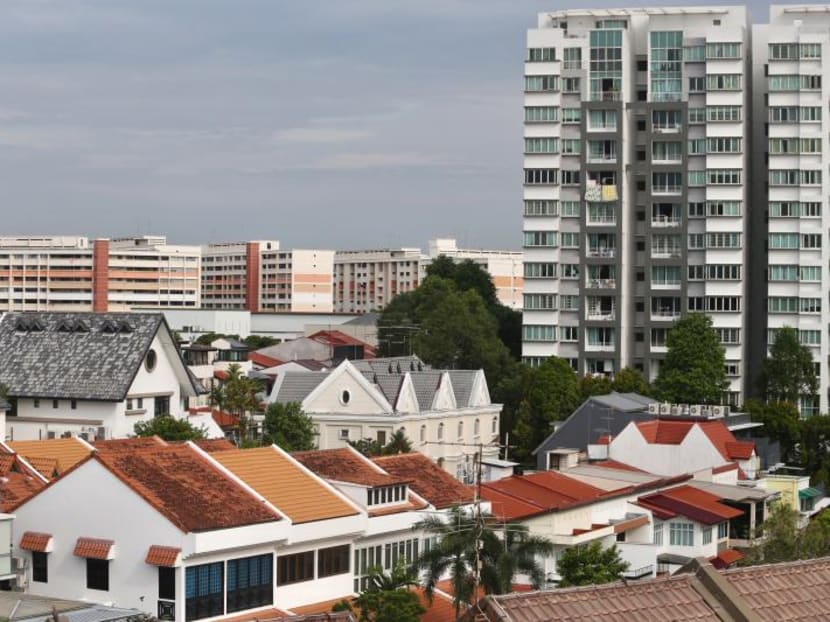Q1 private home prices rise by 3.9%; fastest pace in eight years
SINGAPORE – The Republic confirmed its biggest quarterly surge in private home prices in nearly eight years on Friday (April 27) — a 3.9 per cent jump that beat an earlier estimate of 3.1 per cent, data from the Urban Redevelopment Authority (URA) showed.

The Republic confirmed its biggest quarterly surge in private home prices in nearly eight years on Friday (April 27).
SINGAPORE – The Republic confirmed its biggest quarterly surge in private home prices in nearly eight years on Friday (April 27) — a 3.9 per cent jump that beat an earlier estimate of 3.1 per cent, data from the Urban Redevelopment Authority (URA) showed.
This is the highest quarterly price growth since the 5.3 per cent quarter-on-quarter increase in the second quarter of 2010. In comparison, prices of private residential properties rose 0.8 per cent in the fourth quarter of last year over the previous quarter.
Ms Tricia Song, Colliers International head of research for Singapore, noted that it was “rare to see such a wide variance between the actual and flash numbers”. Flash estimates are based on data from the first two months of the quarter.
“That said, this is not surprising given that home buying activity was brisk towards the end of March and units sold were generally pricier,” Ms Song added.
PropNex Realty chief executive Ismail Gafoor noted that despite the absence of new launches, transactions in the first three months of the year totaled 5,328 units, 126 units higher than a year ago. Mr Ismail said the record price level reflects “a clear sign” of positive market sentiments in the private residential segment, which has experienced three consecutive quarters of price increases so far.
Mr Ismail said the price increases were broad-based, with the outside central region or suburbs seeing prices go up by 5.6 per cent. The core central region and rest of central region (RCR), or city fringes, saw a 5.5 per cent and 1.2 per cent growth in prices respectively.
The uptick in the private property market has also spread to the rentals and resale segments, the experts noted.
Resale transactions accounted for almost seven in 10 of all private home sale transactions in the first quarter. In total, 3,666 units changing hands, which was more than double the 1,496 resale units sold in the first quarter of last year. Meanwhile, rentals of private homes rose by 0.3 per cent in the first quarter, the first quarterly increase since late-2013.
“Given the easing supply going forward, we expect occupancy to improve and rents could stabilise in 2018 and recover from second half of 2018 onwards,” Ms Song said. She expects rentals to go up by 2 per cent, double Colliers International’s earlier forecast.
As at the end of the first quarter, URA said a supply of 40,330 incomplete private residential units (excluding executive condominiums) are in the pipeline with planning approvals, with 23,514 units unsold.
This supply is higher than the 36,029 units (18,891 unsold) in the previous quarter.
The URA noted that 9,848 units (including ECs) will be completed in the next three quarters of this year, and another 9,446 units (including ECs) will be completed in 2019.
Mr Ismail expects transaction volume for private properties for this year to be “well above” 25,000 units, the highest since 2013.
At this juncture, it is unlikely for the government to intervene to cool the market, said Ms Christine Li, senior director and head of research at Cushman & Wakefield Singapore.
“Huge liquidity and low interest rate environment has supported the demand for housing,” she said.
ZACD Group executive director Nicholas Mak, however, is concerned with the growing supply of unsold units and potential new units waiting for launch in the pipeline. The number of such units has increased by 24.5 per cent quarter-on-quarter, he noted.
“These numbers do not include potential number of new units that could be developed on land parcels and en bloc projects that were recently acquired by developers and where planning approvals were not obtained yet,” he said.
Meanwhile, the Housing and Development Board (HDB) resale market has experienced contrasting fortunes compared to the private property market.
The price trends for these segments have continued to diverge, with the HDB resale price index contracting by 0.8 per cent for January to March.
Analysts have said that the increase in housing grants, shorter waiting time for Build-To-Order flats in certain housing estates, a strong supply of new public housing units, and the Government’s pronouncement that it will not renew the leases of HDB flats when they run out are some of the factors pushing down HDB resale prices.
In the next quarters, HDB resale prices are expected to eventually rebound, the analysts said.
Given the huge number of en bloc sales since last year, Mr Ismail predicts “a greater demand for HDB resale properties with some en bloc owners considering bigger sized resale flats in the second half of the year”.
For the full year, the analysts said they expect HDB resale prices to be flat or grow by up to 1 per cent.






